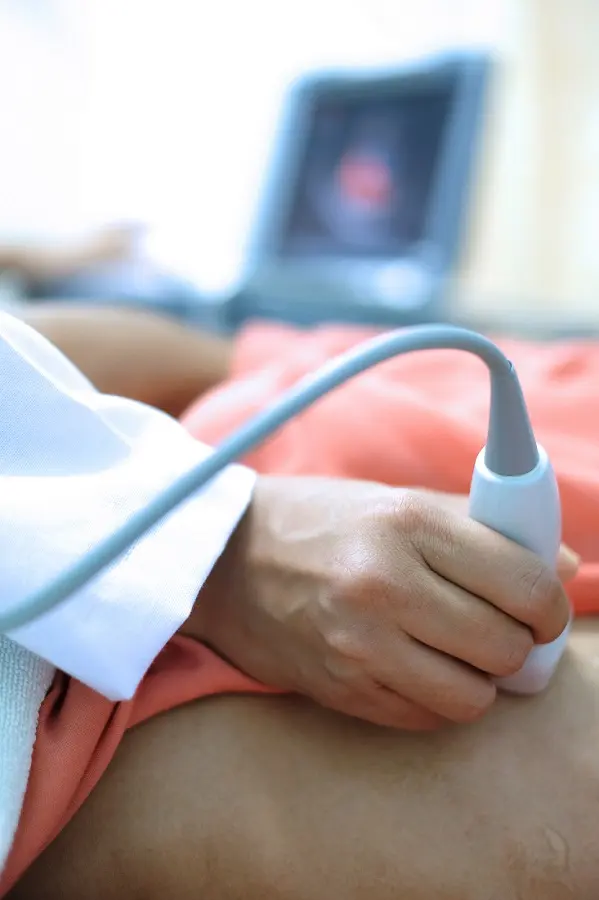Echocardiograms
Cardiocare, as a leading echocardiology center with multiple offices in DC and Maryland, offers its patients echocardiograms in our ICAEL-certified echo lab. Echocardiograms are used to thoroughly examine the structure and function of your heart.
What Is an Echocardiogram?
A transthoracic echocardiogram, or echo as it’s commonly known, is an ultrasound of the heart. It’s a non-invasive imaging test that uses high-frequency sound waves to allow your cardiologist to visualize the heart muscle and assess its structure and function in real-time. Our expert sonographers obtain the echo images, which are then reviewed by your cardiologist. This invaluable test is widely used in cardiology to work up coronary artery disease, heart failure, heart rhythm problems, and valvular disease.
How Does an Echocardiogram Work?
An echocardiogram uses sound waves to create detailed pictures of your heart.
Here’s how it works:
- High-frequency sound waves: These sound waves are sent into your chest, and they bounce back from different parts of your heart, similar to how sonar works.
- Echoes are captured: These echoes are picked up by a special device called a transducer, which is placed on your chest.
- Images are created: The transducer converts the echoes into moving images of your heart that appear on a computer screen.
These images allow your doctor to see:
- How well your heart is pumping blood
- The size and shape of your heart chambers
- The function of your heart valves
- The flow of blood through your heart
This information helps your doctor diagnose and monitor various heart conditions.

Types of Echocardiography Tests
CardioCare offers a variety of echocardiography techniques. Your doctor will recommend the most suitable type of echocardiogram based on your heart conditions.
Transthoracic Echocardiogram (TTE)
This is the most common type of echocardiogram. A small ultrasound wand is placed on your chest that sends sound waves into your heart. These waves create images that show your heart’s structure and function.
Transesophageal Echocardiogram (TEE)
TEE provides a more detailed look at your heart than a TTE. A small, flexible tube (like a thin endoscope) is inserted through your throat and allows your doctor to see your heart from different angles. This test is done in a hospital setting under light anesthesia.
Stress Echocardiogram
This test assesses how your heart performs under stress. You might either exercise on a treadmill or receive medication that simulates physical activity. This helps doctors identify any issues with blood flow to your heart, potentially indicating coronary artery disease (CAD).
What Do My Echocardiogram Results Mean?
Once your echocardiogram is complete, a cardiologist will carefully analyze the images to compile a detailed understanding of your heart health.
The results can provide valuable information about:
- Your heart’s structure: The size, shape, and thickness of your heart walls, as well as how well your heart chambers are working.
- Heart function: How efficiently your heart is pumping blood, and if there are any issues with blood flow.
- Heart valves: The function of your heart valves, including whether they are opening and closing properly, and if there are any leaks or narrowing.
- Possible issues: Your doctor can also check for potential problems like tumors, infections around your heart valves, blood clots, or issues with the major blood vessels connected to your heart.
Don’t worry if these results sound complicated! Your doctor will explain everything clearly, answering any questions you have and outlining any necessary next steps or treatment plans.
When Should I Get an Echocardiogram?

An echocardiogram can be a valuable tool for assessing your heart health, but not everyone needs it.
You should consider getting one if you experience any of the following:
- Chest pain: To diagnose potential coronary artery disease or other heart problems.
- Heart murmurs: To identify problems with heart valves or blood flows.
- High blood pressure: To monitor the overall health of your heart and blood vessels.
- Congestive heart failure: To assess heart function and guide treatment options.
- Congenital heart disease: To diagnose and monitor heart defects.
- Adult congenital heart disease: To monitor the heart and guide treatment for heart defects present since birth.
- Monitoring after heart surgery: To evaluate the effectiveness of treatment and identify any potential complications.
- Sleep apnea: To assess the impact of sleep apnea on your heart health.
It’s important to note that your doctor will determine if an echocardiogram is necessary for you based on your individual health history and symptoms.
How to Prepare for Your Diagnostic Echocardiogram
Preparing for your echo test is simple and straightforward.
Here are some tips:
- Inform your doctor: It’s important to let your doctor know about any medications you’re taking, including over-the-counter medications, vitamins, and supplements. This information helps ensure the test is safe and accurate for you.
- Eat a light meal: To avoid any potential discomfort during the test, it’s best to avoid eating a heavy meal a few hours beforehand. A light snack or some water is fine.
- Avoid caffeine: Caffeine can affect your heart rate, so it’s best to steer clear of it before your appointment.
After the procedure, you’ll receive your echocardiogram results from your healthcare provider. After an echo, our cardiologists will thoroughly explain the findings and discuss any necessary next steps, including treatment options, further testing, changes to your medications, or routine follow-up.
Why Choose CardioCare for Echocardiography Services?
At CardioCare, our team of highly skilled, board-certified cardiologists with extensive experience in echocardiography, provides personalized, comprehensive care.
- We utilize state-of-the-art technology to ensure accurate diagnoses and create effective treatment plans for you.
- We strive to make your experience as comfortable and convenient as possible.
- We take the time to listen to your concerns, answer your questions, and explain your results in a way you can understand.

Echo Heart Test Reviews
Don’t Overlook Your Heart Health!
Get expert heart care with comprehensive echocardiogram services at CardioCare. For more information or to book an appointment with our knowledgeable team, contact us today at (301) 656-5050.
The echocardiogram procedure itself is relatively quick, typically taking about 20-40 minutes. However, your entire appointment may last a bit longer, usually an hour or more. This includes time for check-in, reviewing your medical history with our staff, and a consultation with your doctor to discuss the results of your test.
You’ll be asked to wear a hospital gown and remove any jewelry that might interfere with the test. You’ll then lie on a table while a technician applies an ultrasound wand to your chest (for a standard echocardiogram) or throat (for a transesophageal echocardiogram, or TEE). Once the test is complete, you can return to your normal activities right away.
The cost of an echocardiogram varies depending on your insurance coverage and the type of echocardiogram you need. We encourage you to call our office to discuss your insurance benefits and the potential costs associated with your test.
For your echocardiogram appointment, you can dress as you normally would for a doctor’s visit. Don’t worry about getting dirty: we’ll provide a gown to wear for the test and make sure you’re comfortable and prepared for the procedure! You also don’t need to bring anything special with you for an echocardiogram.
There aren’t restrictions on eating before your echo. However, it’s always a good idea to check with your doctor to confirm. There might be specific instructions based on your individual health or the type of echocardiogram you’re getting.
Generally, you can take all of your medications as prescribed on the day of your echocardiogram. But don’t hesitate to talk to your doctor about whether or not you should take your medications before your echo.